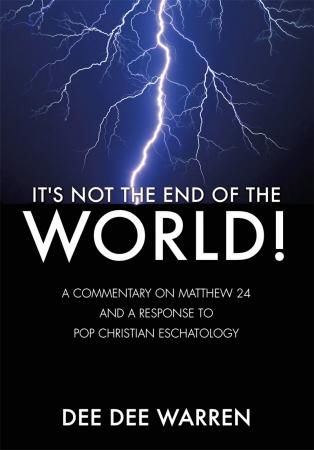 My friend Dee Dee Warren joins me to discuss preterism, the Olivet Discourse, and her new book, It’s Not the End of the World! A Commentary on Matthew 24 and a Response to Pop Christian Theology.
My friend Dee Dee Warren joins me to discuss preterism, the Olivet Discourse, and her new book, It’s Not the End of the World! A Commentary on Matthew 24 and a Response to Pop Christian Theology.
Music
- Free For All, It’s Not the End from the album, Service With a Smile, 2007
Promoted Resources
- The Dividing Line, with Dr. James White, Director of Alpha & Omega Ministries
- Listen online most Tuesday mornings at 11:00am PDT, and most Thursday afternoons at 3:00pm PDT.
- Subscribe to the podcast via Sermon Audio.
- Dee Dee Warren’s book, It’s Not the End of the World! A Commentary on Matthew 24 and a Response to Pop Christian Theology


Chris beat me to the punch when he addressed this point. He makes the point that Jesus does not address the question that the disciples didn’t have or wouldn’t have had in their minds. I made a similar point in a paper I wrote addressing this passage regarding the second coming. It’s my position that Matthew 23 verse three shows one particular question with three parts. When Jesus says that the temple is going to be thrown down, the disciples basically ask a three-part question. This leads me to understand that Jesus is going to answer that particular question specifically. This then leads me to maintain that everything in Matthew 24 and Matthew 25 answers the disciples’ question. This does not mean that Jesus addresses an entirely new topic in Matthew 24 verse 36. Otherwise Chris will have to take his words back and say that Jesus does address a question that wasn’t even in the disciples’ minds. Why would Jesus talk about a future return in some far-off distant time when this wasn’t even the disciples’ question? It’s as if Jesus were saying, “I know you’re asking about the destruction of the temple but here’s some information about thousands of years from now.”
One of the primary critiques Chris mentions is reading back into the text of Scripture one’s own particular context. This is the error of dispensationalism. They misunderstand the language of the Bible because they don’t understand how the Bible speaks. DD and Chris make good points along these lines. I would like to follow their train of thought and apply their words to Matthew 25.
The problem dispensationalism faces is a literal reading of Matthew 24 when Jesus says what he says about the sun the moon and the stars. If a person does not understand prophetic judgment language, error Will follow when that language is read by that person. So, because dispensationalism doesn’t understand prophetic language of judgment they misinterpret Jesus’s words. I would challenge that this is what happens in Matthew 25 as well. Because the reader thinks the language speaks of judgment in such a way that It can only be at the end of time, that’s what he imposes on the text.
I think it very strongly that to make this break between Matthew 24 Matthew 25 is very much a butchering of the text. There is no reason not to read the parables in Matthew 25 as consecutive with Matthew 24. All of the book of acts and the book of Hebrews and many of the epistles and the revelation speak of the judgment that Jesus mentions in Matthew 25. The point in the first century is in whom are you going to take refuge? And how will you treat the apple of God’s eye?
Matthew 25 is not some generic application made for all time about how certain people are treated. Matthew 25 is specifically about prophetic warnings against abusing Jesus’s bride. The language in Matthew 25 is not literal but covenantal. Just like the cosmic language of destruction is established in the Old Testament so to the language of national judgments by God.
The call of the disciples to go out and make disciples of the nations by preaching the gospel to the world is a call not only did Jews but also to Gentiles as the book of acts demonstrates. In the world at that time all of the nations knew about the God of Israel and had synagogues throughout their societies so that when the judgment against Israel came in AD 70 there have been plenty of warning About which side one should be on when the hammer fell.
The transition between the old covenant and the new covenant lasted 40 years and was the same as the transition from the former heavens and earth to the new heavens and earth.
Hi. I do an internet broadcast and wanted to see if you would come on to discuss dispensational premillennialism and how the 70 week prophecy has no gap. Thanks.
Can you tell me more about your broadcast? Do you have a link I can visit?